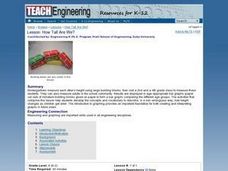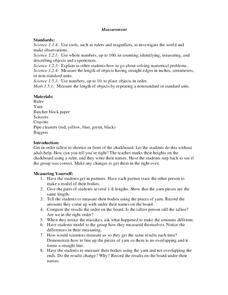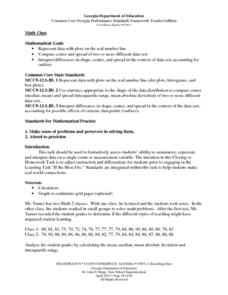Curated OER
Practice with Mass
Fourth graders investigate the weight/mass of a number of items using grams, and equivalents. They examine the use of a triple beam balance before massing objects including oil and water. They go over the weights they amassed and weigh...
Curated OER
Solar System Bead Distance Activity
Students create a scaled solar system model using colorful beads. In this space science lesson, students convert AU units into metric measurements. They arrange the planets according to their distances from the sun.
Curated OER
All About Me
Third graders investigate the use of centimeters while measuring items with rulers which they construct. They examine the need for standard units of measure. They estimate the length of body parts before making the actual measurements.
Curated OER
How Tall Are We?
Students in a Kindergarten class measure each other's height using large building blocks and then visit a 2nd and a 4th grade class to measure those students. They display the results in bar graphs, comparing the different age groups.
Curated OER
Comparing and Ordering Numbers
Students compare, order, and measure objects. In this measurement lesson, students are assessed on their ability to order, compare, and measure objects. This is an assessment only lesson and does not include instruction.
Curated OER
Measurement Activity
Students line themselves up from smallest to tallest at the chalkboard with the teacher marking their heights. After recording their names on the board next to their mark, they work with a partner to measure their height using several...
Curated OER
Bison Eating
Fifth graders use metric measurement to study the amount a bison eats. In this measurement activity, 5th graders watch a video about bison and discuss the amount of food they eat. Students weigh their food trays at lunch and complete a...
Alabama Learning Exchange
The Water Cycle
Learners identify the stages of the water cycle. They listen to the book "Magic School Bus: Wet All Over," examine the Build Your Own Water Cycle website, predict and measure the amount of water in a jar for a week, and read a short play...
Curated OER
Sand Babies
An engaging lesson which has elementary learners measure weight to the nearest pound and construct and interpret a bar graph! They measure length using non-standard units and determine area using square tiles. Pupils round their birth...
Cornell University
Beam Focusing Using Lenses
Explore optics using an inquiry-based experimental approach! Young scholars use a set of materials to design and build a unit capable of focusing a beam of light. They experiment with different lenses to determine the best approach to...
Curated OER
Industrialization, Chemicals and Human Health - Math
Students review the units of the metric system, and practice estimating measures before actually converting between the two systems of measurement. They participate in activities to visualize a concentration of one part per million....
Teach Engineering
Cellular Respiration and Bioremediation
You can breathe easily now that you've found a winning resource. Young biologists learn about the process of cellular respiration, primarily through teacher-led discussion and instruction. They also consider the concept of...
Alabama Learning Exchange
Abundant Area
Explore the relationship between perimeter and area. Learners input the area and perimeter for shapes on the Shape Explorer website, solve problems using geoboards, complete a worksheet, create a PowerPoint presentation, and take an...
Curated OER
Dinosaur Math
Second graders practice vocabulary related to measurement, mathematics, and dinosaurs. Using the engaging topic of dinosaurs, learners will calculate various information about dinosaurs and use measurement vocabulary. They will also...
Curated OER
Just Me and My Shadow
Students take measurements throughout the day using a simple sundial called a gnomon. They record the results on a Data Log and convert from English units to metric (S.I.) units. Data points are plotted on the same graph and analyzed.
Cornell University
Splitting Water with Electricity
Explore how electricity splits water molecules into hydrogen and oxygen. Learners begin by calculating the voltage necessary to separate the water. They then perform the experiment and measure the ratio of hydrogen and oxygen bubbles.
Curated OER
2nd Grade - Act. 05: Olympics
Learn more about the Olympics with your 2nd graders. Using a variety of resources, your class will learn about healthy bodies, training, and eating properly. Additionally, they will discover various Olympic activities and the athletes...
Curated OER
Getting it Right! An Investigation of the Pythagorean Theorem
In order to learn about the Pythagorean Theorem, young mathematicians investigate relations and patterns between different sides of a right triangle to look for possible relations among the squared sides. Once they have established the...
Teach Engineering
Household Energy Conservation and Efficiency
Are your household devices eating up a lot of energy? Pupils investigate household energy efficiency through a set of activities. They find ways to improve energy efficiency and reduce consumption. This is the 21st installment of a...
Teach Engineering
Viscous Fluids
Elasticity and viscosity. Help your class understand the similarities and differences with an introduction to viscous fluids. After describing four types of fluid behaviors: shear thinning, shear thickening, Bringham plastic,...
Curated OER
Bloodstain Pattern Simulations: A Physical Analysis
Students receive bloodstain pattern evidence from a crime scene. They answer a series of questions through inquiry, observation, measurement, and analysis. Pupils complete this challenge, by reconstructing the evidence through four...
Teach Engineering
Can You Take the Pressure?
Do not let the pressure get to you. The first lesson in a unit of 22 introduces the concept of air pressure. Using background knowledge, the resource gives teachers the information they need to discuss how people measure air pressure and...
Georgia Department of Education
Math Class
Young analysts use real (provided) data from a class's test scores to practice using statistical tools. Not only do learners calculate measures of center and spread (including mean, median, deviation, and IQ range), but...
Teach Engineering
Air Pressure
Investigate what is pushing on us. An intriguing lesson plan has pupils calculate the amount of force on various squares due to air pressure. Using the data, individuals create a graph in the third lesson plan of the Up, Up and Away unit...























